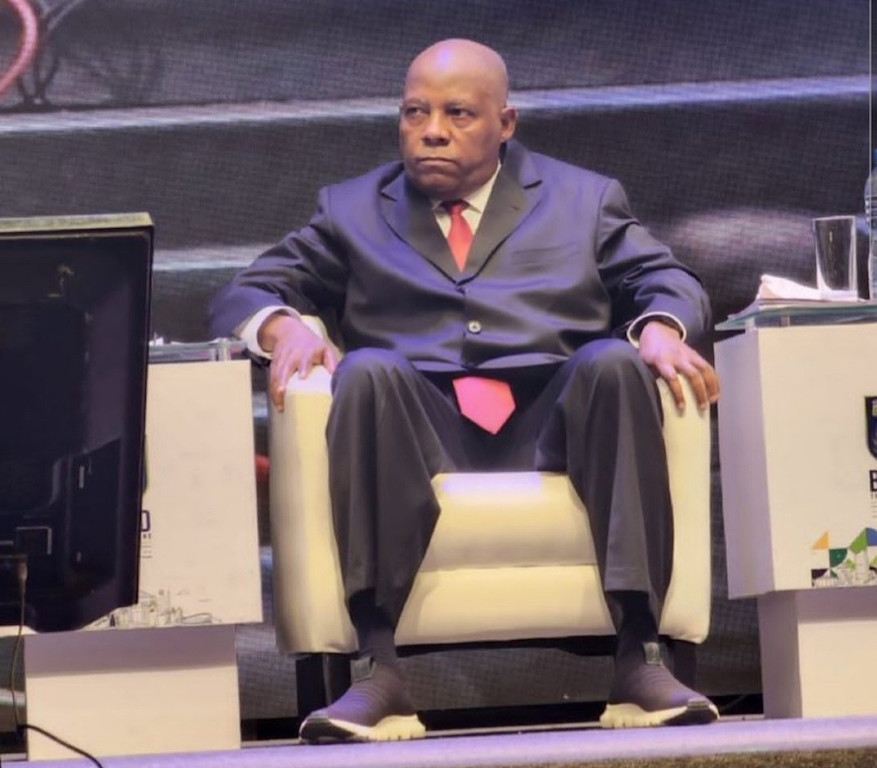Shoes are far more important than just the things you wear on your feet. They have built and destroyed reputations and legacies, ruined businesses and aided or abetted political careers. And as we have seen over the last week, despite Nigerian’s short attention span, one man’s shoes have been the centre of discussions. And this won’t be the first time that shoes have been on the front foot in the country’s recent history.
As French fashion designer Christian Louboutin said, “A shoe has so much more to offer than just to walk in.” Maybe there is no great philosophy in what Louboutin said since his business is to make and most importantly to sell shoes.
We have learned that there is politics behind Senator Kashim Shettima’s choice of shoes for the NBA conference, a choice that has triggered widespread reaction and the “#Shettimachallenge” on Twitter.
At first, I wanted to dismiss this mischievousness over Shettima’s shoes as merely the customary flippancy with which Nigerians engage with issues. Not only because it is not unusual for a man to wear a suit on sneakers—it is in fact fashionable now—but principally because Shettima and his principal, Bola Tinubu, are seeking the mandate to rule Nigeria for the next four years and I thought more attention should be paid to his choice of words than his choice of shoes.
Upon reflection, it becomes evident that there is a lot more riding on those shoes because shoes have had a way of leaving larger-than-life footprints on the face of nations.
Take the Philippines for instance. Ferdinand Marcos ruled the country from 1965 to 1986 when he was ousted by widespread protests. Marcos holds the Guinness Record for the “greatest robbery of government” in history. Yet somehow, his wife, Imelda Marcos, surpasses the late president in notoriety. To her credit, Imelda beautified her hometown and Manila, the capital. She founded the cultural centre and built the lavish Coconut Palace, which she offered as a guest house to Pope John Paul during his 1981 visit to the catholic-majority country. The pope deemed the palace too opulent to live in, especially given the high levels of poverty in the country and found himself a more modest accommodation.
Yet, when the ‘people’s power revolution’ forced the first family into exile and protestors stormed the presidential residence, it wasn’t the priceless paintings on the walls, the velvet cushions or the gold-gilded furniture that annoyed them the most, not even Imelda’s irreverent jewelry collection. It was the discovery of rows and rows of size 8.5 shoes, 3,000 pairs of them, belonging to Imelda Marcos.
“I did not have 3,000 pairs of shoes. I had one thousand and sixty,” Imelda said. But no one cared to listen. To this day, in the eye of the world, she remains Imelda of the 3,000 shoes.
Those shoes became the symbol of the decadence of the Marcos regime and the subject of numerous articles and documentaries. It defined that family’s legacy and over three decades later, when her son, Ferdinand Marcos Jr ran and won elections for president of the Philippines (don’t ask me how)it was Imelda’s 3,000 shoes that formed the basis of commentaries.
Shoes can cause all sorts of problems, I tell you. Failing to take them off at certain places too could get one in trouble. Remember when Vice President Yemi Osinbajo was running for president and ran, figuratively speaking, into a mosque still wearing his shoes? A few days later, he was photographed in the bedroom of the late President Yar’adua’s mom, his legs still swaddled in his shoes. Remember, a section of people took umbrage, called the VP irreverent and cursed him. Some even said he would not get their votes because of that. There might be other issues involved, but at least, they hinged their decision on his shoe politics. He did not put his best foot forward, if you get the pun.
Shoes might have caused people to hate Imelda Marcos and curse Osinbajo, but for someone like President Goodluck Jonathan, shoes, or the lack of them at some point in his life, helped him win an election for the first time ever. When Jonathan stood in front of a crowd at Eagle Square to declare that he had no shoes growing up, Nigerians put their hands over their hearts and swooned. Of course, he said other things that no one particularly remembers but even his campaign jingles on the radio started with that quote and “I had no shoes!” became the mantra of hope for dreaming Nigerians.
Kenya’s President-elect, William Ruto, also had no shoes growing up and made sure he used that to win Kenyans over and secure the votes that propelled him to power.
Louboutin was right. Shoes are more than just for walking. They can be effective tools for political protest and critique as well. One of the most powerful protest statements ever was made not with words, books or a documentary. It was made with a pair of shoes when Muntadhar al-Zaidi, an Iraqi journalist, threw his shoes at then-visiting American President, Goerge W. Bush to protest the invasion and destruction of his country.
Al-Zaidi went to jail for assaulting a visiting president and all that. He had worked for years as a journalist and probably published some significant stories in his life, but it is the story of his shoes that he will be remembered for the most. In Tikrit, Sadam Hussein’s hometown, there is a giant bronze shoe statue erected to represent the one Al-Zaidi hurled at Mr Bush.
Do you see how powerful shoes as a tool of protest or political statement can be?
Shoes also represent other ideas. A lot has been said about Peter Obi’s two pairs of shoes as well. There is a video of the Labour Party presidential candidate showing someone these pair of shoes that he had bought at Mark and Spencer for 49.99.
“People pack them and put them in their houses. Everywhere shoes, everywhere watch,” Mr Obi said in the video. “You don’t need them.”
A conversation between Mr Obi and Imelda Marcos would be very interesting indeed.
Yet, while for Mr Obi, his shoes are a statement on financial frugality, for Senator Shettima, his were a political statement in themselves.
Kashim Shettima, whose shoes have got the country and its social media space excited is far from the fashion ogre that people are trying to portray him as. He is in reality a smart politician, a well-read and articulate person. On a visit to Maiduguri some years back, I marvelled at the “mega schools” he built as a “snub to the insurgency.”
If there was anything wrong with his dress style at the NBA conference, it wasn’t wearing sneakers, but wearing a tie and failing to unbutton his suit when sitting down. In videos of him speaking at the conference, he did look smart but that one uncomplimentary photo put him in the limelight for the wrong reasons.
Apparently, his decision to wear sneakers to the NBA conference was a political statement. A deliberate choice to counter the anticipated hostility of the crowd at the conference—the same learned persons who would later smash furniture while fighting over conference souvenirs.
“When I was told that it was a hostile crowd – I am a banker, trained by one of the best bankers in the world. I am a Jim Ovia boy – I deliberately wore sneakers to snub at them,” Shettima said.
Regardless, Nigerians have had their fun on Twitter with the #Shettimachallenge. This is not to say that people should not take shoes or the politics of shoes seriously because they could be life-changing. Ask Cinderella or ask GEJ. It is all good to have fun. Life is too grim anyway.
But what is at stake is far too serious to be trifled with persistently. The NBA conference was the first time the three leading candidates, including Atiku Abubakar, have engaged with Nigerians and addressed the Nigerian situation. It is possible to play shoe politics and take the measure of the candidates by what they can do by their career footprints and what they actually say. The candidates said meaningful things Nigerians should engage with and interrogate. Sadly, the focus has been on shoes rather than issues.

 Join Daily Trust WhatsApp Community For Quick Access To News and Happenings Around You.
Join Daily Trust WhatsApp Community For Quick Access To News and Happenings Around You.


